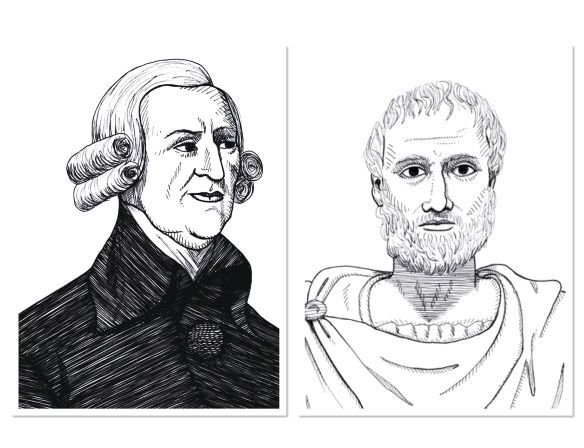Friendship in Adam Smith and Aristotle (May 2023)
May 2023

with Elaine Sternberg

with Elaine Sternberg
Friendship animates the work of both Aristotle and Adam Smith. Two whole books of Aristotle's Nicomachean Ethics, c.20% of the total piece, are devoted to the subject of friends, 'the greatest of all external goods'. In The Theory of Moral Sentiments, Adam Smith similarly considers friendship 'the best and most comfortable of all social enjoyments'. In addition, Smith's work famously reflects what has been described as "arguably the greatest friendship in the history of philosophy", his relationship with the philosopher David Hume. Both Aristotle and Adam Smith identify various forms of friendship, highlight the importance of friendship to the moral life and, unlike many modern authors, value friendship's judgemental character. Their accounts of friendship diverge mainly insofar as their works have different objectives, and unequal metaphysical foundations.
Any translation or edition may be used but discussion references are easier if participants include Book.Chapter.Paragraph and/or Bekker numbers. The Bekker numbers that are used in scholarly citation can be viewed online at the Perseus Project.
An inexpensive print source with Bekker numbers and the full texts of several key Aristotelian works is the Modern Library Classics edition of The Basic Works of Aristotle, edited by Richard McKeon.
Pre-registration is required, and we ask you to register only if you can be present for ALL sessions. All readings are available online. Participants who successfully complete ALL sessions will be eligible to receive an Amazon e-gift certificate.
Session I: What is Friendship?
Tuesday, May 2, 2023, 2:00-3:00 pm EDT
What is friendship? How does it reflect the character of the friends? Who can be friends?
Aristotle, Nicomachean Ethics*
Aristotle, Nicomachean Ethics*
- Book 8: Chapters 1-6 (pp.161-168)
Chapters 11-12 (pp.173-175)
Adam Smith, The Theory of Moral Sentiments**
- Part I.i.1 (full: §1-13) (pp. 9-13)
- Part I.i.2 (full: §1-6) (pp. 13-16)
- Part I.ii.4 (full: §1-3) (pp. 38-40)
- Part VI.i (full: §1-16) (pp. 212-217)
- Part VI.ii.1 (full:§1-22) (pp. 218-227)
- Part VII.iv (§3-4) (p. 328)
Session II: Friendship and Morality
Tuesday, May 9, 2023, 2:00-3:00 pm EDT
How do friends contribute to the moral life? What role does knowledge play in friendship? When are friends needed most?
Aristotle, Nicomachean Ethics
Aristotle, Nicomachean Ethics
- Book 9, Chapters 2-12 (pp.180-195)
Adam Smith, The Theory of Moral Sentiments
- Part I.i.3 (full: §1-10) (pp. 16-19)
- Part I.i.4 (full: §1-10) (pp. 19-23)
- Part II.ii.2 (full: §1-4) (pp. 82-85)
- Part III.1 (§1-6)* (pp.109-116)
*This previously incorrectly indicated the listed pages were the full section but it is not.
Session III: Friendship and Justice
Tuesday, May 16, 2023, 2:00-3:00 pm EDT
Session III: Friendship and Justice
Tuesday, May 16, 2023, 2:00-3:00 pm EDT
What duties does friendship impose? How do justice and rules operate in friendship? Is friendship unfair?
Aristotle, Nicomachean Ethics
Aristotle, Nicomachean Ethics
- Book 8, Chapters 7-10 (pp.168-173)
Chapters 13-14 (pp.175-178)
- Book 9, Chapter 1 (pp.179-180)
Adam Smith, The Theory of Moral Sentiments
- Part III.4 (§7-12) (pp.159-161)
- Part III.6 (§1-11) (pp.171-176)
- Part VII.ii.1 (§9-14) (pp.269-272)
- Part VII.iv (§1-12) (pp.327-331)
*Readings' page and paragraph references for the Aristotle are to Nicomachean Ethics (Kegan Paul, Trench, Trubner, and Company, 1893. 5th edition; translated by F.H.Peters)
**Readings' page and paragraph references for Smith are to The Theory of Moral Sentiments ('TMS'), 6th Glasgow Edition 1869, edited by D.D.Raphael and A.C.Macfie (Indianapolis: Liberty Fund, 1982; reprint of 1976 OUP edition). Part.Section(when available).Chapter (when available).Paragraph(s)